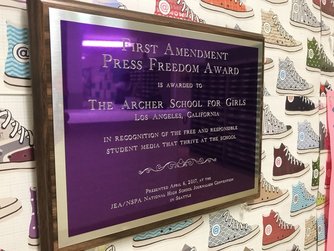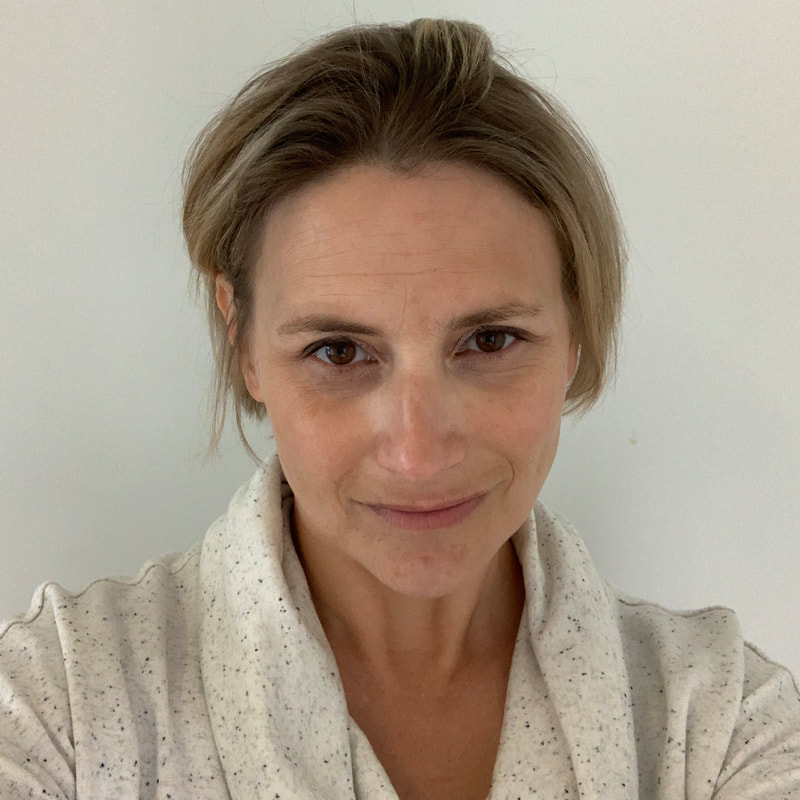 My school's 2017 First Amendment Press Freedom Award hangs on the way in the upper school. Allowing students final editorial say in all content provides them with a real citizenship experience, but it also means adults letting go of the urge to shield and protect and instead empowering their voices. My school's 2017 First Amendment Press Freedom Award hangs on the way in the upper school. Allowing students final editorial say in all content provides them with a real citizenship experience, but it also means adults letting go of the urge to shield and protect and instead empowering their voices. Teachers and administrators want to help our students. We want to give them the tools to succeed, but we also sometimes want to protect them — to shield them from harsh truths and difficult situations. When I'm teaching my journalism students about the social role of the mass media and their own societal role as young journalists, I also think a lot about my role as their adviser. I argued earlier this year that if we want students to value citizenship, we must let them be citizens, but citizenship isn't easy, and it isn't "safe." Citizenship means taking an active role, speaking truth to power, and taking risks. If I want them to learn to be citizens, I must resist that urge to shield and protect and instead empower them to make their own decisions and take responsibility for the outcome. Although they will be recognized for their perseverance, Balthazor says he will always remember how, even as Brown tried to shield them from the dangers of the adult world, Smith pushed them to take responsibility for it. Earlier this month, I wrote about the remarkable team of high school journalists who uncovered fraud in their incoming new principal Amy Robertson's resume, which eventually led to her resignation. These students clearly understand citizenship and their role as watchdogs after making the hard choice to write a story directly targeting an administrator. What is inspiring me today, however, is the Wichita Eagle's article about Emily Smith, the adviser who gave her students the strength to take this risk. The article outlines how a student uncovered some discrepancies and asked Smith for help looking into them. A little research and a meeting with the superintendent led to disturbing information and raised troubling questions about the validity of Robertson's educational credentials and experience. Smith could have protected her students. She could have withheld information or told them —accurately — that pursuing this story was going to rock the boat in a serious way and could result in an adversarial relationship with their new principal. She also could have sat down with them and told them what to do — pursue it, or let it be. Instead, Smith gave them the information and left the room, leaving them to discuss and decide if they wanted to report this story. She empowered them to make a hard choice. She told this team of six student journalists that she would support them no matter what they decided, but she also made sure they considered their societal responsibilities. "If you guys decide this is not your place or it's over our head, I would completely respect that," Smith said in a video interview about the conversation she had with them. "However, you need to think about your responsibility to the community and the situation you're in," she said. "It's not always easy to do the right thing, and I think what you're doing is right." Despite skepticism from superintendent Destry Brown and a Skype interview with Robertson (rather awkwardly supervised by Brown) where students had to interrupt to ask any questions, they pursued the story. Despite being scolded by Brown for being too hard on Robertson in that interview and being told he hoped they would write "a nice piece welcoming Robertson to the community" to make up for it, they pushed on. Despite losing Smith's advice after Spring Break when she recused herself on the advice of the director of Kansas Scholastic Press Association due to a potential conflict of interest — she'd been on an early hiring committee panel — they kept going. Smith brought in local reporters to act as adult advice but stepped back from the process and didn't see the final story until it was printed. Despite how hard these professional journalists pushed the students to corroborate and fact-check and sometimes re-interview, they wrote the story and met the deadline. This is a story about grit and trust. It's a story about teaching students to push forward despite obstacles. It's a story about teaching teenagers that they are strong enough and smart enough and trustworthy enough to be citizens. It's also a story about that terrifying moment as an adviser when you must step back and trust that you have given your students the tools and ethical foundation to be journalists. As Smith notes in the video, had they been wrong, this would have been a very different story. They would not have been invited to the White House Correspondents Dinner, nor would they be flooded with congratulatory messages from national publications or an invitation from Duke to apply to its journalism program. Smith would have been in a very awkward position with the new principal, who would likely have placed some of the blame for the students' decisions on Smith herself — however unfairly, since students have all final say on content as per Kansas' free speech laws. But making mistakes is also part of being a citizen, and accountability is another crucial lesson about adult life. Part of being a good adviser is knowing you, too, are taking a risk, but the risk is worth it. The Eagle's article ends with Connor Balthazor, one of the team of six students who reported the story, reflecting on the difference between Superintendent Brown's and adviser Smith's approaches to the situation: Sometimes we must persist, despite warnings and explanations and fears of repercussions. Sometimes we have to be willing to take risks alongside our kids. While we must provide them with guidance, advice and foundational skills, we must also have the courage to trust our students to be citizens.
0 Comments
Leave a Reply. |
About“And though she be but little, she is fierce!” -A Midsummer Night’s Dream Archives
December 2020
Categories
All
|

 RSS Feed
RSS Feed